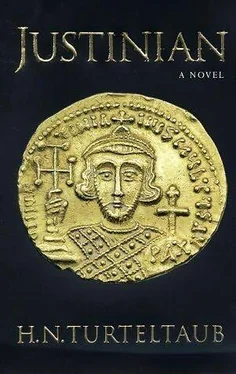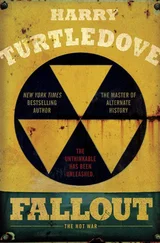Harry Turtledove - Justinian
Здесь есть возможность читать онлайн «Harry Turtledove - Justinian» весь текст электронной книги совершенно бесплатно (целиком полную версию без сокращений). В некоторых случаях можно слушать аудио, скачать через торрент в формате fb2 и присутствует краткое содержание. Жанр: Историческая проза, на английском языке. Описание произведения, (предисловие) а так же отзывы посетителей доступны на портале библиотеки ЛибКат.
- Название:Justinian
- Автор:
- Жанр:
- Год:неизвестен
- ISBN:нет данных
- Рейтинг книги:3 / 5. Голосов: 1
-
Избранное:Добавить в избранное
- Отзывы:
-
Ваша оценка:
- 60
- 1
- 2
- 3
- 4
- 5
Justinian: краткое содержание, описание и аннотация
Предлагаем к чтению аннотацию, описание, краткое содержание или предисловие (зависит от того, что написал сам автор книги «Justinian»). Если вы не нашли необходимую информацию о книге — напишите в комментариях, мы постараемся отыскать её.
Justinian — читать онлайн бесплатно полную книгу (весь текст) целиком
Ниже представлен текст книги, разбитый по страницам. Система сохранения места последней прочитанной страницы, позволяет с удобством читать онлайн бесплатно книгу «Justinian», без необходимости каждый раз заново искать на чём Вы остановились. Поставьте закладку, и сможете в любой момент перейти на страницу, на которой закончили чтение.
Интервал:
Закладка:
I pointed out to sea, where those burning dromons still sent up thick pillars of smoke, and where the wreckage of other vessels, most of them belonging to the followers of the false prophet, bobbed in the waves. Our own warships protected the seawalls like a pack of friendly dogs guarding a farmhouse. "Look, Father," I said, maybe thinking he did not know what we had done.
He looked. Then he looked westward, where the Arabs were still swarming off the vessels that had reached the Thracian shore. "Now the battle begins," he said.
My father was right. The followers of the false prophet had not labored so hard nor come so far to flee when their first assault miscarried. It was to be four years before Constantinople saw the last of them. From April till September, the Arabs would attack the land wall or Roman troops would sally forth from it to raid their encampments at Kyklobion.
Sometimes they would catch the raiders before our men could regain safety. Then, often, they would kill them before our eyes to put us in fear. Sometimes our men would return in triumph, with prisoners and booty. I remember them singing as they led dejected Arabs up the Mese from the wall to the Forum of Constantine. Our headsmen put some of the prisoners to the sword, to avenge our own butchered men. Others were sold for slaves. Even besieged, our merchants would not turn aside from profit. The deniers of Christ should all have been killed.
They kept their war galleys busy on the Sea of Marmara. Thanks to the liquid fire, and thanks to the towers on our dromons that gave our archers the advantage over theirs, they quickly grew reluctant to fight great sea battles, as they had done when they came forth from Kyzikos. But they were always out hunting for merchantmen, and, because they were known to be hunting, few merchantmen put to sea. Deprived of much of the harvest of Anatolia that normally fed it, the city became a hungry place.
I did not know hunger. How could I? I was the Emperor's son. Having made its acquaintance since, I must say I do not regret missing the earlier introduction. But if those years when the Arabs besieged the imperial city were empty of bodily hunger for me, they were full of the spiritual hunger of loneliness.
When the weather began to grow chilly toward the end of the first September of the siege, the Arabs withdrew from their camps on Thracian soil, sailing back to Kyzikos to winter there. We rejoiced, though even then we expected they would return with the spring like migrating birds. And, near the time of Christ's birth, my mother presented my father with a second baby boy.
He named the boy Herakleios, partly because that name had been in the family for generations and partly, I think, because he had just made up his latest quarrel with my uncle of that name and wanted to put a tangible seal on their reconciliation. Herakleios proved a weak and sickly baby, which was an omen for the reconciliation as well.
Bearing my little brother left my mother weak and sickly, too. And, even for an Empress of the Romans with eunuchs and wet nurses and other serving women to attend her should she lift a finger, a new baby sucks time as greedily as it sucks milk. In looking after little Herakleios, my mother all but forgot about me. My father, with the weight of the Roman Empire on his shoulders, already seemed to have forgotten.
And so, by the time I had six years, I did whatever I chose, for who besides my father and mother would tell me no? Often I would gather up a couple of excubitores and, with them as escort, go atop the seawall to watch our dromons and those of the Arabs clash on the Sea of Marmara. The excubitores never protested when I put them to such work. Why should they? They were imperial bodyguards and I was the Emperor's son; therefore, their duty included guarding me. Aristotle could not have made a clearer syllogism.
When the warships did not put to sea, I sometimes had my bearers carry me to the land wall so I could peer down at the Arabs vainly trying to break into the God-guarded imperial city. I even went out to the lower, outer wall- once. When word of that got back to my father, he remembered me long enough to forbid it. That only made me want it more.
The bearers, as was natural, stood in too much fear of my father to give in to my wishes, and withstood even my fiercest tantrums. So did the excubitores. That wounded me to the quick. They were fighting men. Could they not see I wanted to put myself at the forefront of the battle?
When tantrums failed, another boy might have tried wheedling. Not I. I had a different plan. One morning on the inner wall, I turned to the excubitor standing alongside me and complained, "I'm too short to see anything from the walkway. Lift me up to the top of the forewall, Myakes."
The forewall running between crenellations is perhaps a foot thick and a little taller than a man's waist. It is so high it need not withstand stones from a catapult or the pounding of a ram, but only give cover to archers behind it.
Myakes frowned. He must have been thinking about something else, and only half heard what I said. "What was that, little Goldentop?" he asked, using a nickname the excubitores often gave me.
MYAKES
Little Goldentop, Brother Elpidios? Yes, Justinian was blond. So was his father, come to that. The house of Herakleios sprang from Armenia, that's true, but as soon as they got out of Armenia and found there were yellow-haired women in the world, they started swiving them. Why, Constantine once told me old Herakleios himself had a bastard boy by a Visigoth from Spain, and let her name him Athalaric after her own father. She must have been a beauty, or good between the sheets, to get away with that.
Oh, quit spluttering, Brother. If you don't hear worse from Justinian later on than you just have from me, I'll be much surprised, that I will.
Justinian? If you want to know the truth, he reminded me of nothing so much as a cat. His face was long- that was true of everyone in his family I saw, and of the others, too, if their coins don't lie- but it narrowed sharply from the cheekbones down, so that he had almost a woman's rosebud mouth and a pointed little chin. And he was graceful, too. Even that young, he always held his body just so: tight-strung, you might say.
JUSTINIAN
"Lift me up!" I repeated. "I want to see what's going on out there."
Myakes frowned but did nothing else. To me, then, he was a man grown: he was man-tall, with a peasant's broad shoulders and broad face. He carried a spear taller than he was and a shield with Christ's holy labarum painted on it: x p. I could make up my mind in an instant. Why could he not?
I did not realize two things, being but a boy myself. For one, though my father and uncles, like me, decided and acted all at once, not all men matched my kin in that; and, for another, Myakes was scarcely more than a boy himself, despite height, despite shoulders. When the sun shone on his face, you could see his cheeks and the outline of his jaw through the beard that sprouted there, a sure proof he had not long been able to raise it. Thus inexperience and uncertainty also made him hesitate.
At last, after what seemed a very long time but probably was not, he laughed and said, "Well, why not? Not much to see, but what there is, you can."
He leaned the spear and shield against the forewall and picked me up. I could tell at once how he had got to be an excubitor, for he was strong as a bull. He might have been lifting a mouse, not a boy. I felt I was flying as he set my feet on the forewall. He kept a grip on my waist, but only to steady me, not to hold me tight.
I had counted on that. I twirled away from him and ran along the forewall, saying as I went, "Promise you'll take me to the outer wall, Myakes, or I'll cast myself down between them right now!" I looked down at the outer wall, there perhaps a hundred feet in front of me. It was quite handsome, bands of stone alternating with brick, the same scheme the inner wall used. I have always had a good head for heights; I was not frightened or giddy. But I remember thinking, How far down the ground looks!
Читать дальшеИнтервал:
Закладка:
Похожие книги на «Justinian»
Представляем Вашему вниманию похожие книги на «Justinian» списком для выбора. Мы отобрали схожую по названию и смыслу литературу в надежде предоставить читателям больше вариантов отыскать новые, интересные, ещё непрочитанные произведения.
Обсуждение, отзывы о книге «Justinian» и просто собственные мнения читателей. Оставьте ваши комментарии, напишите, что Вы думаете о произведении, его смысле или главных героях. Укажите что конкретно понравилось, а что нет, и почему Вы так считаете.












